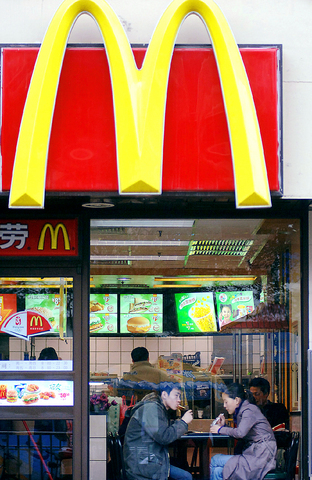A handful of the world's largest food companies and commodity traders, including McDonald's in the UK, are driving illegal and rapid destruction of the Amazon rainforest, according to a six-year investigation of the Brazilian soya bean industry.
The report, published on Thursday, follows a 7,000km chain that starts with the clearing of virgin forest by farmers and leads directly to Chicken McNuggets being sold in British and European fast food restaurants. It also alleges that much of the soya animal feed arriving in the UK from Brazil is a product of "forest crime" and that McDonald's and British supermarkets have turned a blind eye to the destruction of the forest.
The report, by Greenpeace investigators, details how the world's largest private company, the US$70billion a year US agribusiness giant Cargill, has built a port and 13 soya storage works in the Amazon region. It provides farmers with seeds and agrochemicals to grow hundreds of thousands of tons of beans a year, which the company then exports to Liverpool, in the north west of England, and other European ports, mainly from Santarem, a city on the Amazon river.

PHOTO: AP
From Liverpool, much of the high protein soya, which is used as animal feed, goes to Sun Valley, a wholly owned Cargill subsidiary based in Hereford, England, that rears chickens. The company provides McDonald's, the largest fast food company in the world, with up to 50 percent of all the chicken it serves in Britain and across Europe.
According to Greenpeace, public and indigenous land is being seized by farmers using bulldozers and even slave labour. Last year more than 25,000 km2 of Amazon forest were felled, largely for soya farming.
Much of the damage, says the report, has followed the entry of large multinational firms. Using satellite photography and government records, Greenpeace claims it can pinpoint where the destruction has taken place. For instance, only five years ago, much of the land around Santarem was heavily forested. But when Cargill announced plans to build two grain silos, a US$20m terminal and its own port, it had a momentous impact. Satellite images show that in two years, deforestation rates doubled to 28,000 hectares a year, land prices rocketed and soya took off as farmers from all over Brazil arrived to take advantage of guaranteed markets.
Much of that soya would have been trucked to Cargill's silos in Santarem, then shipped to feed Sun Valley-reared chickens that would be sold to McDonald's.
The scale of Amazon defores-tation due to soya expansion driven in part by demand from European firms is unprecedented, says Greenpeace.
About 14,000 hectares in the Santarem/Belterra areas now produce 34,000 tons of soya a year. Further south, Mato Grosso has become Brazil's largest soya-producing state and the one with the greatest deforestation.
Cargill, which dominates much of world trade in commodities, makes no secret of actively aiding soya farmers in Amazon states.
According to Greenpeace, its help is fuelling the development of large soya farms only made viable by the infrastructure the company has put in place.
Cargill and Sun Valley have issued a joint response, saying they have always been trans-parent about their supply chain and were working with conser-vation groups and the industry to minimize environmental harm. "We are committed to sustainable development which creates income to support thriving communities and enables responsible environmental management over time," said a spokeswoman.

The Democratic Progressive Party (DPP), Chinese Nationalist Party (KMT), and the country’s other political groups dare not offend religious groups, says Chen Lih-ming (陳立民), founder of the Taiwan Anti-Religion Alliance (台灣反宗教者聯盟). “It’s the same in other democracies, of course, but because political struggles in Taiwan are extraordinarily fierce, you’ll see candidates visiting several temples each day ahead of elections. That adds impetus to religion here,” says the retired college lecturer. In Japan’s most recent election, the Liberal Democratic Party lost many votes because of its ties to the Unification Church (“the Moonies”). Chen contrasts the progress made by anti-religion movements in

Taiwan doesn’t have a lot of railways, but its network has plenty of history. The government-owned entity that last year became the Taiwan Railway Corp (TRC) has been operating trains since 1891. During the 1895-1945 period of Japanese rule, the colonial government made huge investments in rail infrastructure. The northern port city of Keelung was connected to Kaohsiung in the south. New lines appeared in Pingtung, Yilan and the Hualien-Taitung region. Railway enthusiasts exploring Taiwan will find plenty to amuse themselves. Taipei will soon gain its second rail-themed museum. Elsewhere there’s a number of endearing branch lines and rolling-stock collections, some

This was not supposed to be an election year. The local media is billing it as the “2025 great recall era” (2025大罷免時代) or the “2025 great recall wave” (2025大罷免潮), with many now just shortening it to “great recall.” As of this writing the number of campaigns that have submitted the requisite one percent of eligible voters signatures in legislative districts is 51 — 35 targeting Chinese Nationalist Party (KMT) caucus lawmakers and 16 targeting Democratic Progressive Party (DPP) lawmakers. The pan-green side has more as they started earlier. Many recall campaigns are billing themselves as “Winter Bluebirds” after the “Bluebird Action”

Last week the State Department made several small changes to its Web information on Taiwan. First, it removed a statement saying that the US “does not support Taiwan independence.” The current statement now reads: “We oppose any unilateral changes to the status quo from either side. We expect cross-strait differences to be resolved by peaceful means, free from coercion, in a manner acceptable to the people on both sides of the Strait.” In 2022 the administration of Joe Biden also removed that verbiage, but after a month of pressure from the People’s Republic of China (PRC), reinstated it. The American